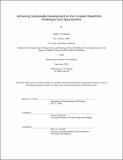Achieving sustainable development on the Croatian waterfront ... : challenges and opportunities
Author(s)
Deranja, Bozho J. D
DownloadFull printable version (1.986Mb)
Other Contributors
Massachusetts Institute of Technology. Center for Real Estate.
Advisor
Dennis Frenchman.
Terms of use
Metadata
Show full item recordAbstract
Croatia stands true to its marketing slogan, "the Mediterranean as it once was", with tiny tiled-roof villages dotting the unspoiled coastline-- but for how long? Since it declared independence from Yugoslavia in 1991, Croatia has been on the rise attracting tourists to its Adriatic coastline and over 1000 islands, reaching its prewar tourism numbers when it led the market as the top destination for European vacationers. Investors, speculators and developers have all followed suit, attempting to take advantage of the beautiful coastline and growing market. However, developers have had minimal success navigating through the overly restrictive planning and permitting bureaucracy. In the meanwhile, two to four story apartment hotels have sprung up like wild fire (legally and illegally) and are dominating the coastal accommodations and threatening the natural landscape. As most of the Mediterranean coastlines are 70% developed, Croatia maintains only 15% of its coast developed; creating a strong comparative advantage that must be preserved and strategically utilized. The current system does not have a vision of how to accomplish this. An analysis of the sustainability of the coastal development process in Croatia was conducted beginning with an intense review of available literature, followed by a series of personal interviews with key figures in the market. The seven coastal counties of Croatia were visited during the interview process where developers, architects, city and state officials, business consultants, lawyers, academics and investors shared their knowledge about the opportunities and challenges of this exciting market. Economic drivers, land use policy, design, financing, infrastructure capacity and operations were all reviewed as key elements of the development process. (cont.) An analysis of these elements produced a final recommendation establishing a vision for the Croatian coast and an Adriatic Coastal Planning Policy to carry out that vision for generations to come.
Description
Thesis (S.M. in Real Estate Development)--Massachusetts Institute of Technology, Dept. of Urban Studies and Planning, Center for Real Estate, 2008. This electronic version was submitted by the student author. The certified thesis is available in the Institute Archives and Special Collections. Includes bibliographical references (leaves 97-102).
Date issued
2008Department
Massachusetts Institute of Technology. Center for Real Estate; Massachusetts Institute of Technology. Department of Urban Studies and PlanningPublisher
Massachusetts Institute of Technology
Keywords
Urban Studies and Planning., Center for Real Estate.